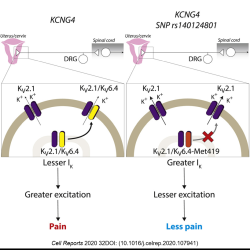
A powerful example of how researching rare genetic variants can provide much wider insights was published recently in a multi-disciplinary, Cambridge-led study of childbirth pain. Together with Dr Michael Lee and colleagues at the Dept. of Anaesthetics, Prof. Geoff Woods’ CIMR team found a rare variant of the KCNG4 gene which was over-represented in a group of women who asked for no pain relief during labour. KCNG4 encodes for the voltage-gated potassium channel subunit Kv6.4. Dr Ewan St. John Smith’s group at the Dept. of Pharmacology then discovered that Kv6.4 was almost exclusively expressed in uterine nociceptors, and that the rare variant of Kv6.4 modulated potassium channels resulting in reduced nociceptor activity. Labour pain is the usual reason given by women for the increasing rates of epidurals for delivery and elective Caesarean sections; this work suggests that systemic delivery of Kv6.4 antagonist could be useful analgesic for labour – without the adverse effects associated with currently available local anaesthetics which occur even when administered via the epidural route.

